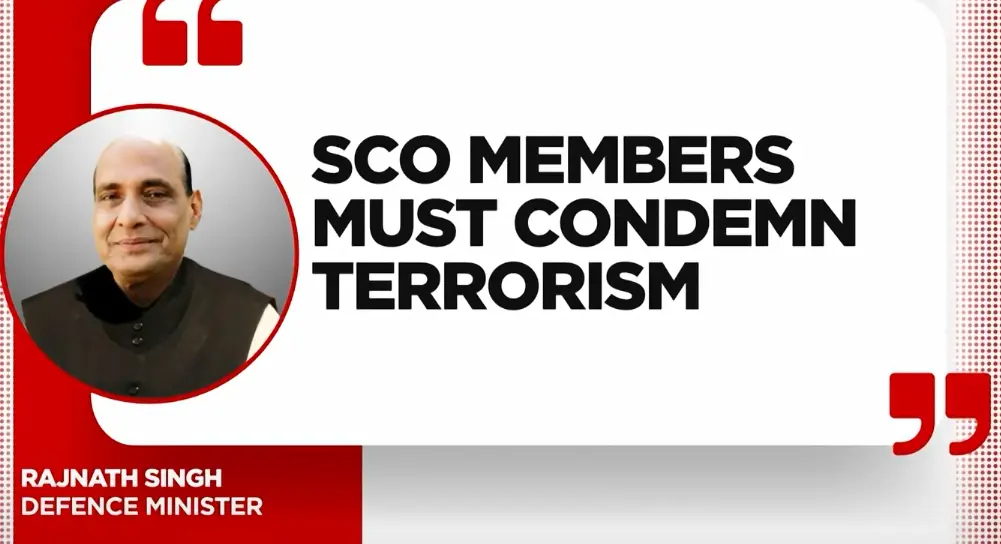
India declined to sign the SCO Defence Ministers' Joint Communique in Qingdao, citing the omission of “cross-border terrorism” and the Pahalgam attack
India Draws the Line: No Compromise on Terrorism
At the Shanghai Cooperation Organisation (SCO) Defence Ministers’ meeting in Qingdao, India made headlines by refusing to sign the joint communique. Its India’s bold stand at SCO. The reason? The document failed to mention “cross-border terrorism” and omitted any reference to the April 22 Pahalgam terror attack that claimed 26 lives, including a Nepali national. Defence Minister Rajnath Singh’s decision was not just a diplomatic gesture, it was a firm assertion of India’s zero-tolerance policy on terrorism.
Singh’s address at the summit was unequivocal. Without naming Pakistan directly, he condemned the use of terrorism as a state policy and criticized nations that provide safe havens to terrorists. “There should be no place for such double standards,” he said, urging SCO members to unite against terrorism in all its forms. His remarks were a clear rebuke to the soft-pedaling of terror threats by some member states, particularly China and Pakistan.
India’s refusal to endorse the communique led to an unprecedented outcome: the SCO bloc did not issue a joint statement. This rare move highlighted the growing divergence within the organization and India’s unwillingness to compromise on core national security concerns.
The Pahalgam Attack and Operation Sindoor: A Turning Point
The Pahalgam attack, carried out by The Resistance Front, a proxy of the UN-designated terror group Lashkar-e-Taiba, was a brutal reminder of the persistent threat of cross-border terrorism. Victims were reportedly profiled based on religious identity before being executed, a chilling tactic reminiscent of past LeT operations.
India’s response was swift and decisive. On May 7, 2025, it launched Operation Sindoor, a targeted military campaign to dismantle terrorist infrastructure across the border. Singh emphasized that India’s actions were a legitimate exercise of its right to self-defense. “Epicenters of terrorism are no longer safe,” he declared, signaling a new era of proactive counter-terrorism.
Despite the gravity of the attack, the SCO communique made no mention of Pahalgam. Instead, it included references to Balochistan, an indirect swipe at India, allegedly inserted under Pakistan’s influence. This imbalance was unacceptable to New Delhi, which viewed the omission as a deliberate attempt to dilute the narrative on terrorism.
Strategic Autonomy and the Road Ahead
India’s decision to walk away from the SCO communique is part of a broader pattern of asserting strategic autonomy. In recent years, New Delhi has resisted aligning with China’s agenda in multilateral forums. It previously declined to endorse China’s Belt and Road Initiative and opposed the BRICS currency basket proposal.
Singh’s visit to Qingdao also marked the first by an Indian Defence Minister to China since the 2020 Galwan Valley clash. While he held bilateral talks with Chinese Defence Minister Admiral Dong Jun, the atmosphere remained cautious. Discussions focused on reviving military communication channels, including the long-dormant India-China hotline.
India’s stance at the SCO summit sends a clear message: national security will not be sacrificed at the altar of diplomatic consensus. By refusing to sign a watered-down document, India reaffirmed its commitment to principled diplomacy and regional stability. As the geopolitical landscape continues to evolve, India’s firm stand at Qingdao may well become a defining moment in its foreign policy narrative, one that prioritizes truth, accountability, and the unyielding fight against terror.
Stay updated with the latest news on Rapido Updates. Keep yourself updated with The World, India News, Entertainment, Market, Automobile, Gadgets, Sports, and many more
2 thoughts on “India’s Bold Stand at SCO: Refuses to Endorse Communique That Ignores Terrorism Truths”